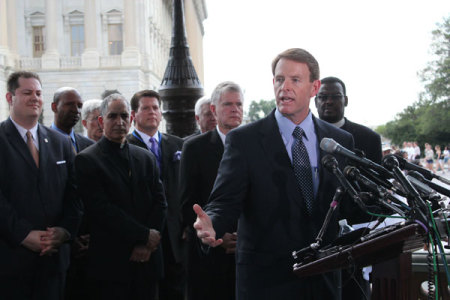Family Research Council Says Utah's Legalization of Gay Marriage 'Deeply Flawed'; Issue Is Not 'Who May Marry, But What Marriage Is?'
The Family Research Council has issued a court brief in Utah's appeal of the legalization of same-sex marriage in the state. The brief, filed last week, claims that the judge's ruling in December to overturn the state's ban on gay marriage was "deeply flawed."

The Christian lobbying group filed its amicus brief last Thursday in the 10th Circuit Court of Appeals, where the state of Utah is appealing federal Judge Robert J. Shelby's Dec. 20 ruling that overturned the state's ban on same-sex marriage, passed by 66 percent of voters in 2004. Shelby wrote in his ruling that the ban on same-sex marriage violates the U.S. Constitution's right to equal protection and due process under the 14th amendment.
In their friend-of-the-court brief, the Family Research Council encourages the appeals court to overturn Shelby's previous ruling, saying that "the novel and unprincipled fundamental rights analysis on which [Shelby's ruling is] based are deeply flawed." The brief goes on to argue that the issue facing the appeals court is "not who may marry, but what marriage is."
"The principal defining characteristic of marriage, as it has been understood in our 'history, legal traditions, and practices,' is the union of a man and a woman. Properly framed, therefore, the issue before this Court is not whether there is a fundamental right to enter into a marriage with the person of one's choice, but whether there is a right to enter into a same-sex marriage," wrote Paul Linton, an appellate attorney who submitted the brief on the FRC's behalf.
Tony Perkins, president of the Family Research Council, added in a press release announcing the amicus brief that relationships between a man and a woman are uniquely important to society.
"Male and female relationships are and will continue to be uniquely important to the future of society. The reality is that society needs children, and children need a mom and a dad. Government regulates marriage to encourage stability in the raising of children."
"As this and other marriage cases are argued in the courts, Americans are learning that redefining marriage is about far more than the marriage altar; it is about fundamentally altering society. In the wake of same-sex marriage, religious liberty and parental rights have been eroded. Business owners, like florists, bakers and photographers have been hauled into court, fined and even put out of business for simply refusing to participate in a same-sex wedding. University professors, sportscasters and even members of the military have been demoted or fired for simply believing marriage is the union of one man and one woman. Families have been impacted as parents have lost the right to determine whose values are taught to their children. Freedoms are lost when marriage is redefined."
"As the American people are given time to experience the actual consequences of redefining marriage, the public debate and opposition to the redefinition of natural marriage will undoubtedly continue to intensify," concluded Perkins.
The FRC's recent amicus brief is one of many expected to be filed in the Utah appeals case. Lawyers for the state filed their opening argument for the case last Monday, focusing on the importance of both mother and father influences for children, saying that the redefinition of marriage poses "real, concrete risks to children," and that the state's main goal is to look out for the welfare of its future generations of residents.
"The diversity of having both a mom and a dad is the ideal parenting environment," Gene Schaerr, an outside attorney who has been hired by the state to lead their defense team, wrote in the opening argument. "That model is not intended to demean other family structures, any more than giving an A to some students demeans others."
The Denver-based 10th Circuit will begin hearing oral arguments for the case beginning April 10. Utah froze recognition of all same-sex marriages that were officiated in the state from December to early January, although the Department of Justice has agreed to recognize the marriages on a federal level.





















